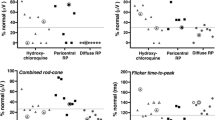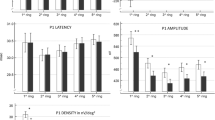Abstract
Purpose
To compare various screening methods for the early diagnosis of retinal dysfunction in patients with long-term chloroquine (CQ) and hydroxychloroquine (HCQ) treatment.
Methods
Twenty patients with long-term CQ/HCQ treatment underwent ophthalmologic evaluation including visual acuity testing, ophthalmoscopy, fluorescein angiography, color vision tests, visual field and multifocal electroretinography (mfERG).
Results
In 14 patients, retinal dysfunction was indicated in the mfERG (reduced amplitudes and/or delayed implicit times) in the parafoveal area. Towards the periphery, the function was normal or only moderately reduced. Ophthalmoscopy and fluorescein angiography identified pathologic retinal changes in seven of these 14 patients. Six patients had normal mfERG, ophthalmoscopy, and fluorescein angiography. Results of color vision and visual field testing were variable even in patients with morphologic alterations.
Conclusion
The use of mfERG may detect retinal dysfunction in a considerable number of eyes with normal ophthalmocopy and fluorescein angiography. The higher variability of color vision and visual field testing results suggests the use of mfERG as primary screening tool for retinal dysfunction in long-term CQ/HCQ treatment.

Similar content being viewed by others
References
Hobbs HE, Sorby A, Freedman A (1959) Retinopathy following chloroquine therapy. Lancet 2:478–480
Shearer RV, Dubois EL (1967) Ocular changes induced by long-term hydroxychloroquine (plaquenil) therapy. Am J Ophthalmol 64:245–252
Bishara SA, Matamoros N (1989) Evaluation of several tests in screening for chloroquine maculopathy. Eye 3:777–782
American College of Rheumatology Ad Hoc Committee on Clinical Guidelines (1996) Guidelines for monitoring drug therapy in rheumatoid arthritis. Arthritis Rheum 39:723–727
Easterbrook M (1999) Detection and prevention of maculopathy associated with antimalarial agents. Int Ophthalmol Clin 39:49–57
Alacron GS (2002) How frequently and how soon should we screen our patients for the presence of antimalarial retinopathy? Arthritis Rheum 46:561
Semmer AE, Lee MS, Harrison AR, Olsen TW (2008) Hydroxychloroquine retinopathy screening. Br J Ophthalmol 92:1653–1655
Mamor MF, Carr RE, Easterbrook M, Farjo AA, Mieler WF (2002) Recommendations on screening for chloroquine and hydroxychloroquine retinopathy. Opthalmology 109:1377–1382
Browning DJ (2002) Hydroxychloroquine and chloroquine retinopathy: screening for drug toxicity. Am J Ophthalmol 133:649–656
Warner AE (2001) Early hydroxychloroquine macular toxicity. Arthritis Rheum 4:1959–1961
Kellner U, Kraus H, Foerster MH (2000) Multifocal ERG in chloroquine retinopathy: regional variance of retinal dysfunction. Graefes Arch Clin Exp Ophthalmol 238:94–97
So SC, Hedges TR, Schuman JS, Quireza ML (2003) Evaluation of hydroxychloroquine retinopathy with multifocal electroretinography. Ophthalmic Surg Lasers Imaging 34:251–258
Penrose PJ, Tzekov RT, Sutter EE, Fu AD, Allen AW Jr, Fung WE, Oxford KW (2003) Multifocal electroretinography evaluation for early detection of retinal dysfunction in patients taking hydroxychloroquine. Retina 23:503–512
Maturi RK, Yu M, Weleber RG (2004) Multifocal electroretinographic evaluation of long-term hydroxychloroquine users. Arch Ophthalmol 122:973–981
Moschos MN, Moschos MM, Apostolopoulos M, Mallias JA, Bouros C, Theodossiadis GP (2004) Assessing hydroxychloroquine toxicity by the multifocal ERG. Doc Ophthalmol 108:47–53
Tzekov RT, Serrato A, Marmor MF (2004) ERG findings in patients using hydroxychloroquine. Doc Ophthalmol 108:87–97
Lai TY, Chan WM, Li H, Lai RY, Lam DS (2005) Multifocal electroretinographic changes in patients receiving hydroxychloroquine therapy. Am J Ophthalmol 140:794–807
Lai TY, Ngai JW, Chan WM, Lam DS (2006) Visual field and multifocal electroretinography and their correlations in patients on hydroxychloroquine therapy. Doc Ophtalmol 112:177–187
Kellner U, Renner AB, Tillack H (2006) Fundus autofluorescence and mfERG for early detection of retinal alterations in patients using chloroquine/hydroxychloroquine. Invest Ophthalmol Vis Sci 47:3531–3538
Lyons JS, Severns ML (2009) Using multifocal ERG ring ratios to detect and follow Plaquenil retinal toxicity: a review: Review of mfERG ring ratios in Plaquenil toxicity. Doc Ophthalmol 118:29–36
Marmor MF, Kellner U, Lai TY, Lyons JS, Mieler WF (2011) Revised recommendations on screening for chloroquine and hydroxychloroquine retinopathy. Ophthalmology 118:415–422
Kellner U, Kleine-Hartlage P, Foerster MH (1992) Cone dystrophies: clinical and electrophysiological findings. German J Ophthalmol 1:105–109
Marmor MF, Hood DC, Keating D, Kondo M, Seeliger MW, Miyake Y (2003) Guidelines for basic multifocal electroretinography (mfERG) (for the International Society for Clinical Electrophysiology of Vision). Doc Ophthalmol 106:105–115
Polyak SL (1941) The retina. University of Chicago Press, Chicago
Hood DC, Seiple W, Holopigian K, Greenstein V, Carr RE (1997) A comparison of components of multi-focal and full-field ERGs. Vis Neurosci 14:533–544
Bernstein HN, Ginsberg J (1964) The pathology of chloroquine retinopathy. Arch Ophthalmol 71:238–245
Rosenthal AR, Kolb H, Bergsma D, Huxsoll D, Hopkins JL (1978) Chloroquine retinopathy in the rhesus monkey. Invest Ophthalmol Vis Sci 17:1158–1175
Wetterholm DH, Winter FC (1964) Histopathology of chloroquine retinal toxicity. Arch Ophthalmol 71:82–87
Shroyer NF, Lewis RA, Lupski JR (2001) Analysis of the ABCR (ABCA4) gene in 4-aminoquinoline retinopathy: is retinal toxicity by chloroquine and hydroxychloroquine related to Stargardt disease? Am J Ophthalmol 131:761–766
Mahon GJ, Anderson HR, Gardiner TA, McFarlane S, Archer DB, Stitt AW (2004) Chloroquine causes lysosomal dysfunction in neural retina and RPE: implications for retinopathy. Curr Eye Res 28:277–284
Bienfang D, Coblyn JS, Liang MH, Corzillius M (2000) Hydroxychloroquine retinopathy despite regular ophthalmologic evaluation: a consecutive series. J Rheumatol 27:2703–2706
Rüther K, Foerster J, Berndt S, Schroeter J (2007) Variabilitat der retinotoxischen Gesamtdosis Chloroquin/Hydroxychloroquin. Ophthalmologe 104:875–887
Rodriguez-Padilla JA, Hedges TR 3rd, Monson B, Srinivasan V, Wojtkowski M, Reichel E, Duker JS, Schuman JS, Fujimoto JG (2007) High-speed ultra-high-resolution optical coherence tomography findings in hydroxychloroquine retinopathy. Arch Ophthalmol 125:775–780
Kellner S, Weinitz S, Kellner U (2009) Spectral domain optical coherence tomography detects early stages of chloroquine retinopathy similar to multifocal electroretinography, fundus autofluorescence and near-infrared autofluorescence. Br J Ophthalmol 93:1444–1447
Author information
Authors and Affiliations
Corresponding author
Rights and permissions
About this article
Cite this article
Mißner, S., Kellner, U. Comparison of different screening methods for chloroquine/hydroxychloroquine retinopathy: multifocal electroretinography, color vision, perimetry, ophthalmoscopy, and fluorescein angiography. Graefes Arch Clin Exp Ophthalmol 250, 319–325 (2012). https://doi.org/10.1007/s00417-011-1753-2
Received:
Revised:
Accepted:
Published:
Issue Date:
DOI: https://doi.org/10.1007/s00417-011-1753-2




